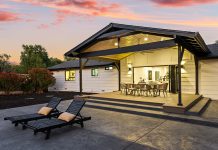Supervisor James Gore had an informal, information-packed conversation at the quarterly luncheon for the Mark West Chamber of Commerce on Feb. 1.
He started out with three main goals for the Mark West Citizens Advisory Council: 1) to focus on when and where to spend the Franchise Fees surtax on Cal Am Water; 2) to give the community a voice on projects proposed for this area, such as the Carlton Senior Living project and the what may come up with the Golf Course; and 3) to review, with him, community needs in the areas of infrastructure, transportation and public works and community well being.
The audience suggested topics they wanted Gore to address.
A hot current issue is sanctuary. Sanctuary is a designation of certain cities, counties and states, saying that they are not going to fully, openly coordinate with Immigration & Customs Enforcement (ICE) for deportation of folks who are undocumented but have potentially gotten involved with the law for a variety of reasons.
It’s harder for counties to declare themselves as a sanctuary than for cities because
less federal funds go into cities. Supervisor Gore emphasized that practically every industry here is built on the backs of a Mexican work force, agriculture, hospitality and others; an immigrant community. While not embracing policies producing fear we do have to assess the risks. If we formally sign ourselves up as a sanctuary county, does that mean that millions of dollars and a lot of programs are at risk?
When asked about SMART, Supervisor Gore told us about his Town Hall meeting in Fulton all about quite zones. It is necessary to set up an infrastructure so that no cars can enter the zone, once the arms go down. Fulton would have to close down two streets–that’s a big impact and costs a couple of million dollars. Countywide, that’s about $6 to $10 million.
He said people voted on SMART and they’ve been paying into it. The money is there for the train and the tracks, money for infrastructure is a different issue.
Naturally, with the weather we’ve had, everyone wanted to hear about the roads.
Gore said Sonoma County put the second most money of any county into roads, consistently, for the last several years, and many roads are being repaired. For the next two summers, Highway 101 will be paved from Windsor to Geyserville, with Geyserville to Cloverdale after that.
He moved on to the subject of the homeless. He feels that the Housing First model is both the economic and the right thing to do. In this county, the Community Development Commission handles homeless issues. The county has created a homeless seniors living area. The first goal for triaging is to go after homeless seniors, youth, vets and families, which make up a large part of the homeless population.
That moved us right to the subject of affordable housing. On a national average, we are in the top 10 percent of counties, in terms of how much disposable income goes to housing, and it’s upwards of 50 percent for many.
Supervisor Gore is passionate about work force housing for agricultural labor. He believes we can easily put a thousand units on agricultural land. The Sonoma County Office of Education (SCOE) is also working on housing for teachers. It’s upsetting that teachers can’t afford housing where they teach.
The county just recently past an ordinance on accessory units, not only allowing accessory dwellings on some properties, but also allowing homeowners to divide their homes into two units.
Lastly, the Supervisor wanted to mention pensions. He said that negotiating pensions is on-going work. This will take a long time to fix. Everybody new is under a new system. They don’t get the same increases as in the past.
Aggie Maggio is a local Realtor and member of the Mark West Chamber of Commerce. She can be reached at Ag*********@****ud.com or (707) 486-1303.







